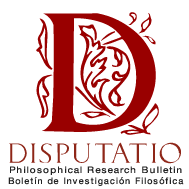Carlo Rovelli
CPT, Aix-Marseille Université, Université de Toulon, CNRS Marseille, France | rovelli@cpt.univ-mrs.fr
Received: 22-November-2017 | Accepted: 19-May-2018 | Published: 31-December-2018
Disputatio [Dec. 2018], Vol. 7, No. 8, a019 | DOI: 10.5281/zenodo.2554714
Article | [ES] | Full Text | Statistics | Copyright Notice [es] | Vol. 7 No. 8
How to cite this article:
Rovelli, Carlo (2018). «La física necesita la filosofía. La filosofía necesita la física». Disputatio. Philosophical Research Bulletin 7, no. 8: a019.
Abstract | Contrary to claims about the irrelevance of philosophy for science, I argue that philosophy has had, and still has, far more influence on physics than is commonly assumed. I maintain that the current anti-philosophical ideology has had damaging effects on the fertility of science. I also suggest that recent important empirical results, such as the detection of the Higgs particle and gravitational waves, and the failure to detect supersymmetry where many expected to find it, question the validity of certain philosophical assumptions common among theoretical physicists, inviting us to engage in a clearer philosophical reflection on scientific method.
Keywords | Philosophy of Physics · Aristotle · Popper · Kuhn.
![]()
La física necesita la filosofía. La filosofía necesita la física
Resumen | Contrariamente a las afirmaciones acerca de la irrelevancia de la filosofía para la ciencia, yo defiendo que la filosofía ha tenido, y sigue teniendo, mucha más influencia sobre la física de lo que se suele asumir. Afirmo que la actual ideología anti-filosófica ha tenido efectos dañinos sobre la fertilidad de la ciencia. También sugiero que algunos recientes e importantes resultados empíricos, como el descubrimiento de la partícula de Higgs y el de las ondas gravitacionales, y el fracaso en la detección de la supersimetría donde muchos esperaban encontrarla, cuestionan la validez de ciertos supuestos filosóficos comunes entre los físicos teóricos, invitándonos a comprometernos en una más clara reflexión filosófica sobre el método científico.
Palabras Clave | Filosofía de la Física · Aristóteles · Popper · Kuhn.
References
Abbott, Benjamin P., et al. (2017). «Multi-messenger observations of a binary neutron star merger». The Astrophysical Journal Letters 848, no. 2: L12. https://doi.org/10.3847/2041-8213/aa91c9
Abbott, Benjamin P., et al. (LIGO Scientific Collaboration & Virgo Collaboration) (2017). «GW170817: Observation of Gravitational Waves from a Binary Neutron Star Inspiral». Physical Review Letters 119, no. 16: 161101. https://doi.org/10.1103/PhysRevLett.119.161101
Carnap, Rudolf (1932) «Überwindung der Metaphysik durch Logische Analyse der Sprache». Erkenntnis 2: pp. 10–31) (English translation «The Elimination of Metaphysics Through Logical Analysis of Language». En: Sarkar, S. (ed.) Logical Empiricism at Its Peak: Schlick, Carnap, and Neurath. Nueva York: Garland Pub., 1996).
Dawid, Richard (2013). String Theory and the Scientific Method. Cambridge: Cambridge University Press. https://doi.org/10.1017/CBO9781139342513
Einstein, Aalbert (1986). «Letter to Robert A. Thornton, 7 December 1944. EA 61-574». En: The Collected Papers of Albert Einstein. Princeton, NJ: Princeton University Press.
Hawking, Stephen (2012). The Grand Design. Nueva York: Bantam.
Heidegger, Martin (1967). Sein und Zeit. Tubinga: Niemeyer.
Heisenberg, Werner (1925). «Über quantentheoretische Umdeutung kinematischer und mechanischer Beziehungen». Zeitschrift fur Physik 33, no. 1: pp. 879–893. https://doi.org/10.1007/BF01328377
Howard, Don (1994). «‘A kind of vessel in which the struggle for eternal truth is played out’—Albert Einstein and the role of personality in science». En: Langdon, J.H., McGann, M.E. (eds.) The Natural History of Paradigms: Science and the Process of Intellectual Evolution, pp. 111–138. Indianapolis: University of Indianapolis Press.
Howard, Don (1997). «A peek behind the Veil of Maya: Einstein, Schopenhauer, and the historical background of the conception of space as a ground for the individuation of physical systems». En: Earman, J., Norton, J.D. (eds.) The Cosmos of Science. Pittsburgh-Konstanz Series in the Philosophy and History of Science, pp. 87–150. Pittsburgh: University of Pittsburgh Press.
Hutchinson, Darren S. y Johnson, Monte Ransome (2005). «Authenticating Aristotle’s Protrepticus». Oxford Studies in Ancient Philosophy 29: pp. 193–294.
Iamblichus (1996). Protrepticus, vol. 6. Berlín: De Gruyter.
Kepler, Johannes (1992). Astronomia Nova (translated by William H. Donahue). Cambridge: Cambridge University Press.
Pickering, Andrew (1999). Constructing Quarks: A Sociological History of Particle Physics. Chicago, IL: University of Chicago Press.
Quine, Willard van Orman (2015). Word and Object. Cambridge, MA: MIT Press.
Rovelli, Carlo (2015). «Aristotle’s Physics: A Physicist’s Look». Journal of the American Philosophical Association 1: pp. 23–40 https://doi.org/10.1017/apa.2014.11
Weinberg, Stephen (1994). Dreams of a Final Theory. Nueva York: Vintage.
© The author(s) 2018. This work, published by Disputatio [www.disputatio.eu], is an Open Access article distributed under the terms of the Creative Commons License [BY–NC–ND]. The copy, distribution and public communication of this work will be according to the copyright notice. For inquiries and permissions, please email: boletin@disputatio.eu.
